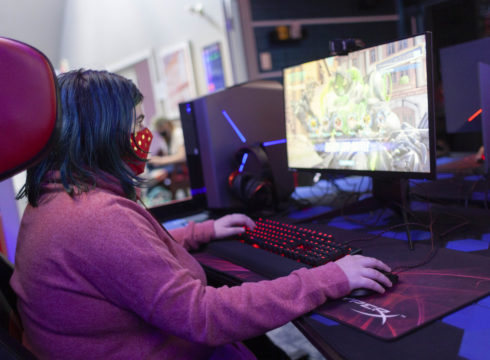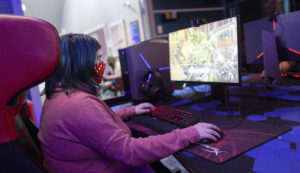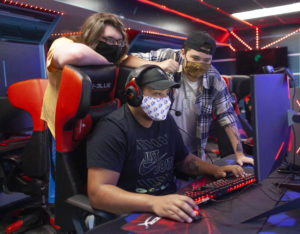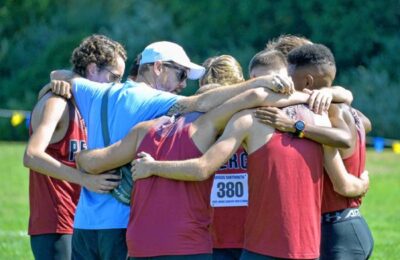Next-Level Competition

If you have spent any amount of time at New England College or getting to know NEC, you probably know that sports are a big deal around here. But did you know there is a new game in town? That new game is esports, a forward-thinking activity that brings video games to life.
What Is Esports?
Esports, for those who may not know, is competitive video gaming. Players are called gamers, and they can compete by themselves from home or as part of teams that have popped up across the country. They can be amateurs or professionals in the multi-billion-dollar industry that is esports. At NEC, esports launched in October 2018, and the esports arena opened in January 2019. The fledgling club grew quickly, expanding to its current slate of 13 different games that are played and roster of 74 gamers for the fall 2021 semester. Originally started as an independent club, esports moved under the umbrella of the Athletics Department in the fall of 2020.
“I have, for most of the last decade, been a proponent of esports belonging under Athletics,” states Josh Staley, who became NEC’s new Director of Esports in March 2021. “What that offers parents and others who are invested in seeing esports succeed at NEC, more than anything else, is familiarity and understanding of expectations. As part of Athletics, we have expectations regarding student GPAs and behavior. It’s clear that these students represent the College.”

Josh Staley, Director of Esports at NEC
Taking Esports to the Next Level
Staley had a quiet summer on the Henniker campus, but he is now looking forward and is eager to take esports at NEC to the next level, just as his gamers play to get to the next level.
In his sixth year of working with esports, Staley continues to encounter some people who do not understand what esports is and the depth of what it offers. As he explains, esports is about more than just competing; it is about offering professional development opportunities for his students. “I’m always thinking about how we can turn students’ esports experience into their next steps. If someone is a Business Administration major, can I guide them toward earning their MBA? If someone wants to work in esports, can I help them get a job in that space?”
And those efforts are already paying off. Kyleigh Werman (Illustration ’22) plays the game Overwatch for NEC and scored a graphic design internship with the Eastern College Athletic Conference (ECAC) as a result of her involvement with esports. This winter, several students will intern with a prestigious professional athletic conference in its esports area. Staley cannot share the name of this conference because of a non-disclosure agreement, but he also cannot hide the pride in his voice as he talks about this opportunity for his student-gamers. “I want to see students succeed,” he adds. “Esports is second to their academic pursuits at NEC.”

Staley knows how to balance gaming time and academic time. If parents wonder how their students can handle both, Staley laughs: “I earned a doctorate, and I guarantee I played video games the whole time. There’s a balance, and I get to help students figure that out. That drives me; that’s why I love this so much.” He earned three degrees—a bachelor’s, master’s, and PhD—in psychology and served as a psychology professor before joining NEC.
As Staley continues to settle in, what does he see as the future of esports at NEC? To start, he sees the program no longer as a bridge between competitive play and non-traditional athletes because NEC’s gamers include athletes from other sports like hockey. Instead, he sees esports as another sport option for anyone who wants to compete. Humberto E. Solis, III (Business Administration ’23) agrees. “I think that it has become antiquated to talk about traditional and non-traditional athletes,” he says. “Everyone should be able to find a place to compete in something if they want.” Solis played rugby in the past and now focuses his competitive energy on the games Rainbow Six Siege and Call of Duty.

Competition for All
One of the changes Staley has made in his time with the program is a commitment to inclusion. Students no longer need to try out for the team and possibly make the cut. Anyone who wants to play is welcome; everyone can compete, no matter how good they are or aren’t. Werman is on board with that decision. “Not every person is able-bodied or can compete in a traditional sport for whatever reason,” she comments. “They still deserve that sense of community and structure that you really only get from being part of a team of some kind.”
That community, Staley believes, can be the missing piece of the college puzzle for incoming first-year students or transfer students. He has done considerable research on the social component of traditional athletics, and the ability for a student to walk into a pre-built social circle is invaluable. Esports offers that social component as well. Over the summer, he introduced incoming first-year students to existing students, and there was an instant connection, which helped alleviate first-day jitters.
Staley further backs up his commitment to inclusion by having one rule: Toxic behavior can never exist in the arena. Students may get heated during a match, but purposefully hurting someone else, he explains, is a student’s ticket out of the arena. He has created a safe environment where students can compete and play and have fun.
“What esports does for students is amazing,” he states. “And you can’t put a price tag on that.”





